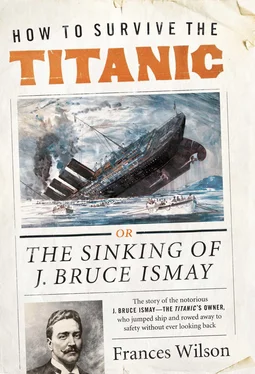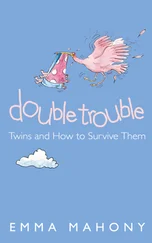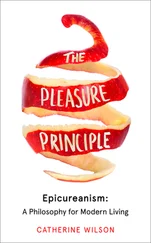First to the stand was the Carpathia ’s wireless officer Harold Cottam, who was questioned about the origins of the Marconigrams, one of which had been received by Congressman Hughes, stating that the Titanic was being towed to Halifax with all her passengers safe on board. If these messages were not sent by Ismay in order to give the White Star Line time to reinsure the ship then who, the inquiry wondered amongst themselves, was responsible for them, and what purpose did they serve? Cottam claimed ignorance, after which the spectators cleared the way for twenty-two-year-old Harold Bride, the Titanic ’s wireless operator, who had already sold his story to the New York Times for a considerable sum. Bride entered in a wheelchair where he sat slumped, his crushed and frostbitten foot in plaster and his pale face leaning against a pillow. Ismay, seated between Franklin and Lightoller, listened to the testimony of one of the men whose survival he had not bothered to inquire about. He heard how Bride and his fellow Marconi operator, Jack Phillips, had ‘joked’ as they sent out CQD signals saying they were sinking by the head. ‘The humour of the situation appealed to me, and I cut in with a little remark that made us all laugh, including the Captain. “Send SOS,” I said, “it’s the new call, and it may be your last chance to send it.” We said lots of funny things to each other in the next ten minutes.’
Soon after the Titanic made contact with the Carpathia, her wireless began to grow weaker so ‘I went out on deck and looked around. The water was pretty close up to the boat deck. There was a great scramble aft, and how poor Phillips worked through it I don’t know. He was a brave man. I learned to love him that night, and I suddenly felt for him a great reverence to see him standing there sticking to his work while everybody else was raging about. I will never live to forget the work Phillips did for the last awful fifteen minutes. He clung on, sending and sending. He clung on for about fifteen minutes after the Captain released him. The water was then coming into our cabin.’ As the band started to play ‘Autumn’, Phillips ‘ran aft’ and as Harold Bride was helping a group of the crew to lower the final collapsible boat, a wave washed them all into the sea.
Bride’s testimony was interrupted at one point when the doors burst open and a woman ran crying into the ballroom. Was First Officer Murdoch alive or dead? Smith asked whether Lightoller ‘would be good enough to tell the lady whatever she wishes to know’. Lightoller, who had been the last person to see Murdoch alive took her aside and explained that ‘Mr Murdoch died like a man doing his duty’, after which she left quietly.
Bride continued. ‘The next I knew I was in the boat. But that wasn’t all; I was in the boat, and the boat was upside down, and I was under it. I just remember realising I was wet through, and that whatever happened I must breathe.’ He got out — ‘how, I don’t know’ — and started swimming from the ship. ‘She was a beautiful sight then. Smoke and sparks rushing from her funnels.’ The band was still playing as the ship ‘flowed’ down. ‘I felt after a little while like sinking. I was very cold. I saw a boat of some kind near me, and put all my strength into an effort to swim to it. It was hard work and I was all alone when a hand reached out… and pulled me aboard.’ The hand came from the upturned collapsible lifeboat which was being manned by Lightoller, and Bride was the last man ‘invited’ on board. Invited? Smith expressed surprise: ‘There were others struggling to get on?’
‘Yes,’ replied Bride who had not heard Lightoller’s testimony the day before, in which he said the opposite: ‘dozens… men were swimming and sinking everywhere’.
‘Dozens in the water?’ Smith repeated. Who were, Smith wondered, the men on the boat?
‘They were all part of the boat’s crew,’ said Bride. A horrified gasp went round the room as the reality of the scene became apparent.
Ismay, sitting at one end of the table, did what he would do throughout the hearings: on sheets of paper taken from the press table, he drew over and over again an image of the White Star flag.
There was no session that afternoon. Instead the committee and their subpoenaed witnesses prepared to leave for Washington, where the proceedings would continue on Monday morning in the less lush atmosphere of the new Senatorial buildings. That night Ismay again asked for, and was again refused, permission to return home, at which point he lodged a formal complaint with James Bryce, the British Ambassador. ‘I have the utmost respect for the Senate of the United States,’ Ismay said, ‘but the inquiry as it is proceeding now may wreak great injustice rather than clear up points in question.’
Senator Smith, Bryce explained to the British Foreign Office, was responding to the parallel inquiry into Ismay’s actions being conducted by the American press, particularly the sensationalist ‘Yellow Press’ dominated by William Randolph Hearst. One of the most powerful formers of opinion in America, Hearst had met Ismay when he was a White Star agent in New York. His immediate dislike of the aloof Englishman was intensified when Morgan made Ismay president of the IMM. A reformist who saw himself as a spokesman for the American people, Hearst owned papers in every region and in six major cities, all of which he treated as a daily letter to his 4 million readers. He called his work ‘government by newspaper’, and whatever causes he championed or campaigned against tended to win the day (the views expressed in Hearst’s New York Journal were credited with provoking the Spanish-American War). His style was defined by one of his editors as ‘Gee-Whizz Journalism’: Any issue the front page of which failed to elicit a “Gee Whizz!” from the readers was a failure, whereas the second page ought to bring forth a “Holy Moses!” and the third an astounding “God Almighty!”’ 9Described by Theodore Roosevelt as an ‘unspeakable blackguard’ who combined ‘with exquisite nicety all the worst faults of the conscienceless, corrupt, and monied man’, Hearst ran a campaign against Ismay which presented him in these same terms. One of Hearst’s publications, the New York American, carried a front-page cartoon of the White Star chairman sitting in a lifeboat watching a sinking ship, accompanied by the words: ‘THIS IS J. BRUTE ISMAY: A picture that will live in the public memory for ever. J. Bruce Ismay safe in a lifeboat while 1,500 people drown. We respectfully suggest that the emblem of the White Star be changed to that of a “Yellow liver”.’ ‘He must be glad he is an Englishman,’ another of his papers said. ‘He is no gladder than we are.’
‘However much may have been written about this school of journalism,’ Bryce explained to the British government, ‘it is difficult for any person not residing in this country to realise to what extent their influence over the less well-educated classes is pernicious in its heartless exploitation of every calamity that has ever saddened, and of every scandal that has ever attracted attention in, this country.’ 10Both William Randolph Hearst and William Alden Smith would stop at nothing, Bryce believed, in their exploitation of the grief and rage of the American people so long as it served their own ends, and for each man the story of Ismay’s survival was bigger than the story of the Titanic itself. Added to which, Senator Smith felt no need to inform Bryce of his actions or intentions. ‘It might have been more courteous,’ the British Ambassador felt, ‘if some communication had been addressed to this embassy, though from persons so ignorant of the usages of international relations as most members of the Senate are no such action need have been expected.’ And as to his qualifications for chairing the committee, it ‘was generally admitted that Senator Smith is one of the most unsuitable persons who could have been charged with an investigation of this nature’. Smith was the type of man who was ‘always anxious to put himself forward where any passing notoriety can be achieved’. The US Secretary of State agreed; the inquiry was ‘mere self-advertisement’. Nor did Taft dispute this assessment of Senator Smith’s character. The President of the United States, according to Bryce, was ‘of the opinion that as long as the chairman of the committee thought it would keep him in the headlines the inquiry would go on’. 11
Читать дальше












